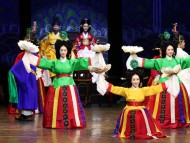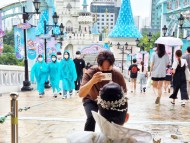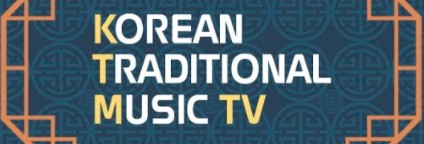2024.05.09 (목)
[대기자 인터뷰] [Chief Reporter Interview] Chair professor Park Beom-hun, ‘Finding New Terrain in Korean Music’
Dongguk University opens the ‘Department of Korean Music’ on their Seoul Campus
Top artists are invited as chair professors and full-time professors
The university founded on religion established measures for the promotion of Buddhist music
- 이동식 대기자
- 등록 2022.08.29 23:37
- 조회수 180,284
In March of next year, the Department of Korean Music will begin their courses
In the middle of August, a man located in his professor’s office is thinking hard about something and thus unable to pay attention to the changing weather outside his window. This man is a musician of Korean traditional music. But also a composer, a music conductor, a Korean traditional music scholar, a university president, an educational and cultural policymaker, and once again returning as a Korean traditional music scholar while looking after his professor’s office, chair professor Park Beom-hun. Recently, Park Beom-hun has been busy with the preparations for the opening of the ‘Department of Korean Music’ at Dongguk University Seoul Campus, deciding on the full-time professors and chair professors, an administration, and so forth. Chief reporter Lee Dong-sik looked for Park Beom-hun, someone he regards as a close acquaintance since the time that Lee was a reporter at KBS. During the 80-minute interview, it became clear that the topic of conversation was the promotion of Buddhist music as new terrain in Korean music by the religious university. From this point onwards, let us listen to his thoughts.
This article was translated by Linda Pauw (intern reporter)
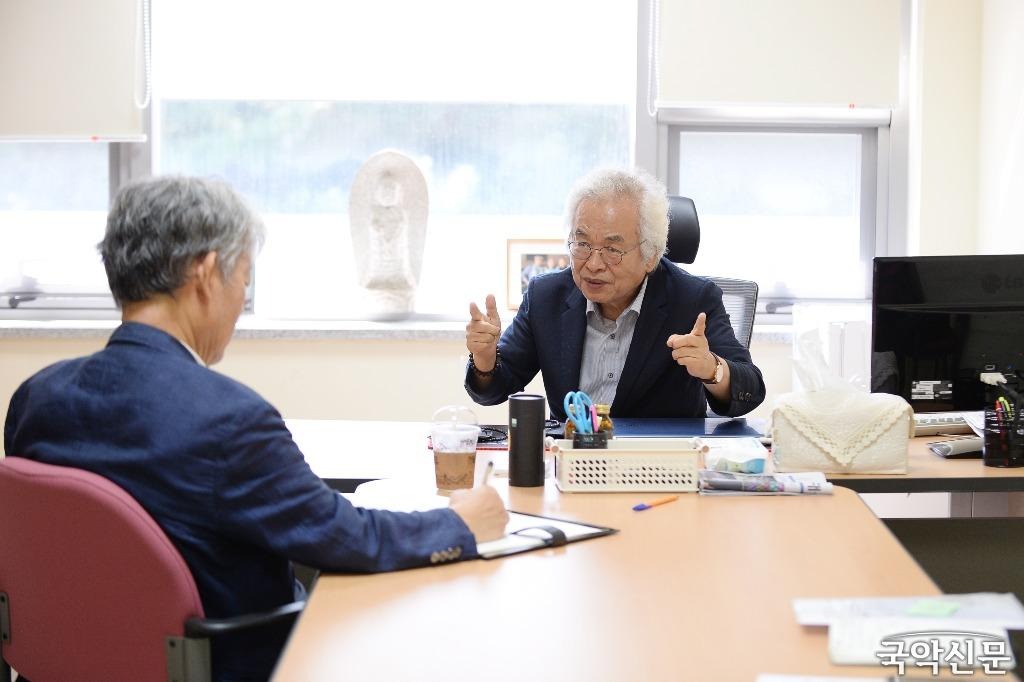
Q. Chief reporter Lee Dong-sik – Instead of going on vacation what are you doing in this hot weather?
A. Chair professor Park Beom-hun – A pleasure to see you. This fall semester we are checking various matters, such as whether the received applications of students for the opening of the college of arts Korean Music Department are going according to plan. Opening a new department is a lot of work. Our department will accept all new students via rolling admissions and there is exactly one month left for this. Creating the content and means of education of the subjects that fit the new department’s vision and purpose of establishment, the confirmation of professors, but also deciding the factors of the screening process, and becoming acquainted with the defined evaluation criteria et cetera are all tasks that need to be confirmed and examined one by one.
Q. Lee – Dongkuk University originally hosted their Korean Music Department on their Gyeongju Campus but the news that a new department is being created in Seoul is unexpected.
A. It is a bit embarrassing to admit but if art-related departments are not operated in places where associated artists come together, inevitably, problems such as the securing of a faculty or students’ classes will arise. Also, our university is a religious university established by the Jogye Order of Buddhism but when the department was still located in Gyeongju, there was an inadequacy regarding the element of promotion of Buddhist music. Therefore, the university authorities should research and teach the foundations of Buddhist music more in-depth for a new terrain of Korean music to open, this can be achieved by suggesting the establishment of a Department of Korean Music in the middle of Seoul as a way for outstanding artists to be more involved as teachers. As you are well aware, the number of universities in the metropolitan area cannot be increased. Thus, by developing the then slightly lacking research and cultivation of Buddhist music in an era in which the world welcomes Hallyu, our university, as a religious university, thought hard about the viewpoint in which we have to bring up the talents of Korean music that our country is demanding, and decided to create a Korean music department in Seoul by turning around the existing capacity of employees.
Q. Earlier, you mentioned that we can cultivate our music through Buddhist music, but the Buddhist music that we know is charged with a specific religious undertone, for instance, Buddhist hymns and chants, Buddhist prayers, and the song ‘Hoesimgok’ that became famous through the singing of Kim Yeong-im and so on. Would it not be difficult to look at this as mainstream traditional music?
A. The foundation of Korean music is Buddhism. As it entered the Three Kingdoms period, it has been Buddhism that has lived with our people for more than 1500 years. The remaining melodies, the stories told in the middle of songs, the beats, and such that were made engraved the three elements of traditional music, song, dance, and appreciation, inside of us before we knew it and are manifesting this without us realizing even in modern times. It is a situation of which we are not aware.
It was through Buddhist scriptures that we learned about the concept of music, not only Buddhist prayers or chants but also Yeongsan Hoesang, Hoesimgok, Binari, Tapdori, Sanyeombul, and more folk songs among Korean traditional music that is performed are all considered to be Buddhist music. So in fact, it has already deeply penetrated our music. I propose that it is important to precisely know these things, to research what we can take and disregard, and to then rekindle this with our artistic talents of this era. As there are 15 applications to our department we cannot say that this suffices, but our goal is to produce the best talent through the direct training of excellent professors, if at all possible.
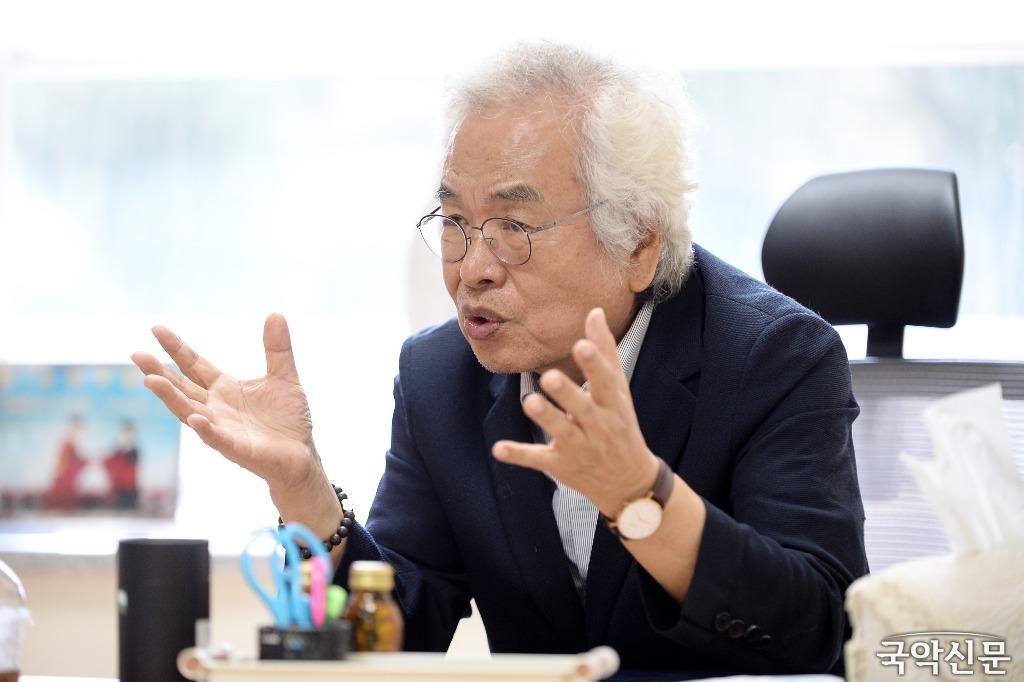
Q. Then, has it been confirmed who will be part of the teaching faculty?
A. We can boast that all musicians representing this era are included in the faculty. Kim Deok-su and An Suk-seon who you know are involved, as well as Kim Yeong-jae, Kim Seong-nyeo, Park Ae-ri, Lee Chun-hui, Kim Hae-suk, and more. We gathered the most outstanding experts in the fields of vocal music, instrumental music, dance, and composition. This September, students can enroll and in March next year, we will open the doors of our new department.
Q. I think there might be concerns about whether the world of traditional Korean music’s demand for manpower is not saturated as there are traditional music departments or Korean music departments at the top universities of our country.
A. Recently, our country is trying to develop the fields of semiconductors and nuclear energy, there is absolutely no manpower discharge structure so would there not be a situation in which you cannot handle the manpower? The current state of our music is filled with anticipation due to the phenomenon of Hallyu, to keep up with this trend more new manpower, and more new talent needs to emerge. These talents, while performing that of the past, have to create new music that surpasses the level of imitation. If you look closely, our traditional music has always been creative music. That is what has been passed down to the next generation.
In this era, we are already making and delivering music that appeals to people over the world beyond our own country, to do this it is absolutely essential to find the strength in our traditional music and reinvent this. Recently, a research that stated that Psy’s song ‘Gangnam Style’ worked well for people around the world because the music was based on a hwimori-rhythm can be regarded as an example of this. To establish this, performing is of course important, but education in composition that maximizes the ability to create new music in each field is absolutely necessary. Our school makes sure that the faculty members can provide personalized one-on-one education to our students. Because the National Theater is nearby, by always seeing, hearing, and learning on site we focus on developing the capability for traditional music to be reborn as the music of this era.
Q. Some are concerned that this era will not last long, as in some areas the current popularity of our idols or the Korean Wave has not been universally recognized.
A. The thing that we are overlooking is that Western music has also derived from religious music. Because Christianity (Catholicism) gave birth to Western music culture, we can say that Western music’s roots are Christianity. Likewise, the roots of East Asian music can be found in Buddhism. Western music incorporated ethnic and regional music from this background. Ethnic music from Hungary, Finland, Russia, Spain, and other Western countries has risen to the mainstream of Western music since the mid-19th century and is currently dominating the world. Asia’s music is based on Buddhist music, and I think it is time for Asian ethnic music to rise as world music. These elements should now be raised as modern music and world music.
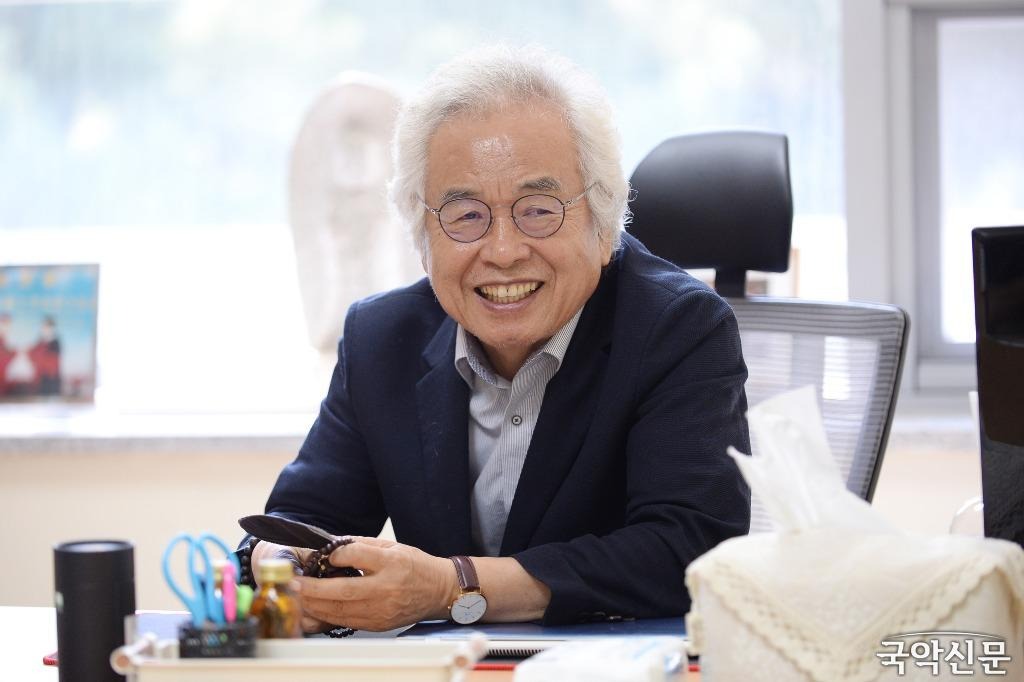
Q. However, the question that always torments us is to what extent is this still our music…
A. Ah, right. Whether we are talking about culture or music, anything new is essentially bibimbap. Think about our bibimbap. As garnish we throw in various vegetables, we add sesame oil, and lastly, we add red pepper paste and mix it all in, this is essential to bibimbap. There might be a difference in the amount of red pepper paste added, but once that red pepper paste goes into our music it really becomes our music. Then we can ask what that red pepper paste represents exactly. Element-wise, for example, it could represent the form of a beat or song, the problem of music intervals, the method of vocal usage, movement, and other different elements like these. The problem is how do we blend these elements? And if we do this correctly, would that not result in the best version of our music? We have to identify these factors and share them.
Q. I think we talked a lot about the new department. As you know too, professor, our gugak industry and our traditional music industry have suffered a lot under the corona pandemic and dealt with problems such as the cancelation of performances and a decrease in its audience although it is slightly getting better lately. How should we look at this? Is there any solution to this?
A. Haha. Us Koreans who see through music or folklore are truly wise people. Don’t we have the wisdom to define objects that bring harm or annoy us as byeolsin or evil spirits, and send them away through a gut (exorcism)? Corona does make our lives difficult, but should even our spirits have a hard time because of this? Just as we overcome our saddest times by singing, we should banish this crisis by holding a byeolsingut (exorcising ritual). This is our humor and positive mind.
Q. A concern that we have is that Western instruments’ expressiveness is powerful by nature whereas there is an aspect to our instruments that makes this expressiveness difficult to follow. How do you look at this problem?
A. Isn’t distinguishing Western instruments from our instruments defining the limits of our music in advance? Previously, I held a North and South Korean concert in Pyongyang, at this concert the cello players who performed wore hanbok, and Western instruments and traditional Korean instruments were able to coexist. A conductor named Seiji Ozawa is a world-famous conductor of Western music. After that yangban came to China, he fell in love with the charm of the erhu and after inviting a Chinese performer to Boston to open a concert together with the Boston Orchestra, the erhu gained worldwide recognition. Now, we need to have the wisdom to exceed the distinction between instruments and styles and open a world of music. In foreign countries, the world of music is already expanding in that direction. I think this starts with us not being bound by instruments or a certain music form but us ‘submitting’ to our music. To be honest, this is a North Korean way of talking though…
Even in our own three Asian countries, each presents its specific national characteristics. I think it is important that we draw from this source when needed and discard it when there is an excess to make a more universal style of music.
Q. However, we still have nationalistic feelings toward Japan and lately, some voices are proposing that the roots of Japanese enka music are Korean.
A. It seems true that, historically, our music moved to Japan during the Three Kingdom period. And that is how it became their music, but are we also not creating music in our own style by adopting Chinese and Western music? Regarding the origin of Japanese enka, there are records of Koga Masao, who is referred to as the founder of enka, having lived in Incheon and lately, a theory has come out that he is Korean, but because the basic vocal register for enka music does not exist in our country it is difficult to say that they have copied what is ours. This is something for researchers to reveal, but it would be sensible to think about how we can embrace this or that element as our own instead of sinking into nationalist sentiments about who is the original or where did someone copy something. In the past, there was a project in which musicians from Korea, Japan, and China worked together. If they looked at the sheet music, they could not express the meaning of the music but when they all held hands, started practicing, and sang, they all related to each other and the music came out wonderfully. Absorbing the strengths of each country and reviving this in the current age, that is the task that is given to us.
Q. I think the time for me to ask other questions that I’m curious about has run out. You are leading the foundation of this Korean Music Department, I hope that through more compositions or the training of our younger generation our music can proudly spread abroad.
A. Yes, as we were in a hurry I have spoken in rambles, but our music is always the beginning. What is clear is that we should not cling to the past and with new music should not just create gugak but also a wide range of Korean music. The answer lies in the fact that nowadays almost all university departments choose the name Korean Music Department. Now we have to find and create Korean music, and we are confident that the foundation of our Dongkuk University’s Korean Music Department under the best leaders of our time creates the opportunity to meet this desire and expectation. Thank you.
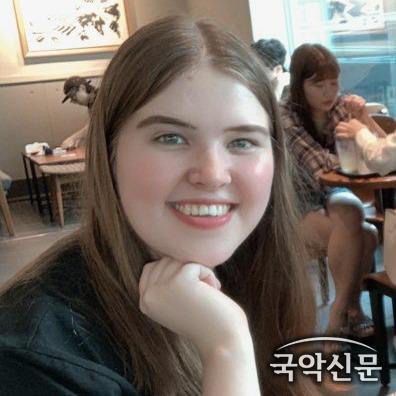
English translation: Linda Pauw (Intern reporter)
Linda Pauw is a Dutch student of Korean Studies and Critical Heritage Studies. Pauw came to Korea after finishing her Master's program at Leiden University to attend Yonsei University's Korean Studies Program.
- [] 제6회 울진금강송 전국국악경연대회(06/08)
- [] 제29회 대통령상 한밭국악전국대회(07/06-07) (무용/기악/성악)
- [] 제8회 목담 최승희 전국국악경연대회(06/01) (판소리,기악)
- [] [서울]제28회 전국판소리경연대회(06/15-16)
- [] 제32회 대전전국국악경연대회(06/01-02)
- [] 제16회 순천 낙안읍성 전국가야금병창경연대회(05/25-26)
- [] 제18회증평국악경연대회(05/11)
- [] [군산]제32회 전국청소년민속예술경연대회(05/18)
- [] 제42회 전주대사습놀이 학생전국대회(5/18∼6/2)
- [] 제50회 전주대사습놀이 전국대회(5/18~6/3)
- [] 제20회 전국대금경연대회(06/08-09)
- [] 제4회 함양 전국국악경연대회(05/12)
- [] 제18회 대한민국 전통예술무용·연희대제전(06/09)<br>무용(전통무용…
- [] 제48회 부산동래 전국전통예술경연대회(06/15-16)(무용.기악)
- [] [부여]제1회충남전국청소년국악경연대회(05/04)(판소리.기악.타악)
- [] [광주]제21회 대한민국 가야금병창대제전(06/16)
- [] 제18회 과천전국경기소리경창대회(05/04)
- 제11회 곡성 통일전국종합예술대전(06/15-16)(판소리.무용, 기악,…
- [] 제24회 인천국악대제전 전국국악경연대회(05/25-26)
- [] 제26회 창원야철전국국악대전(07/06- 07)
- [] 2024 무안장애인 승달국악대제전(06/01-02)
- [] 제22회 무안전국승달국악대제전(06/01-02)
- [] 제10회 전국공주아리랑민요경창대회(05/26)
- [] 제17회 상주전국국악경연대회(05/19)(성악/무용·연희/기악)
- [] 제10회 전국밀양아리랑경창대회(05/26)
- [] 제21회 강남전국국악경연대회(05/22)(무용/타악/판소리/민요)
- [] 제26회 서편제보성소리축제 전국판소리 고수 경연대회(05/04-05)
- [] [순천]제10회 낙안읍성 전국 국악대전(04/27-28)
- [] 제29회 안산전국청소년국악경연대회(05/26)
- [] 제26회(통합58회) 여수진남전국국악경연대회(05/18-19)
- [] 제51회 대한민국 춘향국악대전 경연대회(05/05)(05/11-12)
- [] 제33회 고령전국우륵가야금경연대회(04/26-27)
- [] [부평]제8회 전국 청소년국악경연대회(05/11)(관악/현악/성악)
- [] 제22회 구례전국가야금경연대회(05/04-05)
- [완도]제24회 장보고국악대전 전국경연대회(05/05-06)(무용/판소리…
- [] 제23회 대한민국 빛고을 기악대제전(05/25-26)
- [] [인천] 제10회 계양산국악제(04/26-27) (풍물,사물, 기악,민요…
-

[수요연재] 이무성 화백의 춤새(90)<br> 춤꾼 송영은의 '강선영류 태평무' 춤사…
태평무 국가무형유산 '태평무'는 강선영(1925-2016)선생에 의해 전해지면서 격조있는 무대예술로 발전 되었다. 태평무는 나라의 풍년과 태평성대를 축원하는 뜻을 지니...
-

[수요연재] 한글서예로 읽는 우리음악 사설(192)<br>강원도아리랑
강원도 아리랑을 쓰다. 한얼(2024, 선면에 먹, 53× 26cm) 봄바람 불어서 꽃 피건마는 고닯은 이 신세 봄 오나마나 ...
-

[화요연재] 박상진의 한류 이야기 81 <br> ‘국악의 날’ 지정을 위한 제언(8)…
최근 BTS를 배출한 하이브와 뉴진스를 배출한 어도어의 민희진 대표와의 갈등에 대한 소식이 연일 연예 문화 뉴스를 장식하고 있다. 이러한 갈등 속에 하이브의 주가가 약 1조원 가까...
-

[월요연재] 이윤선의 남도문화 기행(144)<br>거문도 인어 '신지끼' 신격의 계보…
거문도의 인어 신지끼 "안개 있는 날에 백도와 무인도 서도마을 벼랑에서 주로 출몰 바위에 앉아 있거나 헤엄치기도 벼랑위에서 돌 던지기도 한다 해난사고나 바다에서 위험 경고...
-

[PICK인터뷰] 원장현 명인, “산조는 우리 삶의 소리”
[국악신문 정수현 전문기자]=국립국악원 창작악단은 오는 5월 9일과 10일 국립국악원 예악당에서 이태백류 아쟁산조와 원장현류 대금산조 전바탕 '긴산조 협주곡'을 초연한다. 아쟁과 ...
-

[Pick리뷰] 경성 모던걸들의 춤판 '모던정동'…"자유 갈망하는 모습 담아"
30일 서울 중구 국립정동극장에서 열린 국립정동극장예술단 정기공연 '모던정동' 프레스콜에서 출연진이 주요 장면을 시연하고 있다. 2024.4.30 ...
-

세실풍류, 박병천의 '구음시나위'에 허튼춤 선사한 안덕기
국립정동극장이 4월 한달간 진행하는 '세실풍류 : 법고창신, 근현대춤 100년의 여정'에서 23일 박병천의 '구음시나위'에 허튼춤 추는 안덕기 (사진=국립정...
-

세실풍류, 동해별신굿 민속춤사위를 제해석한 조재혁의 '현~'
국립정동극장이 4월 한달간 진행하는 '세실풍류 : 법고창신, 근현대춤 100년의 여정' 에서 조재혁의 '현~' 공연 모습. (사진=국립정동극장). 2024....
-

[Pick리뷰] 이호연의 경기소리 숨, ‘절창 정선아리랑!’
# ‘이호연의 경기소리 숨’ 공연이 지난 4월 26일 삼성동 민속극장 ‘풍류’에서 열렸다. 20대에서 60대까지의 제자들 20명과 5명의 반주자와 함께 경기잡가, 경기민요, 강원도...
-

[PICK인터뷰] 미리 만나 보는 '제94회 남원춘향대전'
[국악신문 정수현 전문기자]=대한민국에서 가장 오래된 축제로 손꼽히는 남원춘향대전(남원춘향제)이 오는 5월 10일(금)부터 5월 16일(목)까지 7일간 남원시 광한루원 일대에서 열...
-

[Pick리뷰] 모던연희극 ‘新칠우쟁론기’
4월 18일부터 20일, 남산국악당에서 아트플랫폼 동화의 모던연희극 ‘新칠우쟁론기’가 펼쳐졌다. [국악신문 정수현 전문기자]=지...
-

[PICK인터뷰] 국립국악관현악단의 채치성 예술감독을 만나다
[국악신문 정수현 전문기자]=봄비가 촉촉이 땅을 적시는 4월, 국립국악관현악단 예술감독으로 취임한 지 6개월이 된 채치성 예술감독님을 만났다. 그는 국악방송 사장, KBS 국악관현...
-

[Pick리뷰] 이 시대의 새로운 춘향가- ‘틂:Lost&Found’
2024 쿼드초이스_틂 (사진=서울문화재단 대학로극장 쿼드 나승열) [국악신문 정수현 전문기자]=대학로극장 쿼드의 ‘쿼드초이스’...
-

[Pick리뷰] 세 악단의 조화로운 하모니, ‘하나 되어’
지난 4일, 국립국악원은 국립국악원 창작악단, KBS국악관현악단, 전북특별자치도립국악원 관현악단 118명으로 구성된 연합 관현악단 무대 ‘하나되어’를 국...


